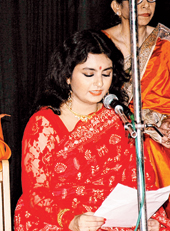 |
| Madhuchhanda Dutta sings Rabindrasangeet in French at Max Mueller Bhavan. Picture by Sanat Kumar Sinha |
De la lumiere te voici illuminant tout de ton eclat…” Though the words were unfamiliar to many in the audience they were guided by the familiarity of the tune of the Rabindrasangeet Aloy alokmoy kore hey ele alor alo. The event was Alliance Francaise du Bengale’s tribute to Rabindranath Tagore in association with Eshana, a cultural organisation.
Held in Max Mueller Bhavan, the programme featured renditions of Rabindrasangeet by Manoj Murali Nair and Kamalini Mukherjee. But it was Tagore in French that brought the curtains up and down on the evening. “We came to know of the versatility of Tagore from Romain Rolland’s writings on the bard. Like Jean Cocteau, he used all means at his disposal to express himself,” said Alexandre Martinez, the director of Alliance Francaise du Bengale.
The French lyrics of the opening song had been penned by Paramita Das, a teacher in Calcutta University’s French department who has translated all the 157 poems in Tagore’s Gitanjali from Bengali to French.
“Andre Gide had translated Gitanjali into French but those were the 103 poems contained in the Nobel-winning English Gitanjali which Tagore had translated himself,” says Das, who spoke in French on Tagore’s internationalism, citing his correspondences with Rolland.
How difficult is it to render a Rabindrasangeet in translation?
“Quite,” says Madhuchhanda Dutta and Aantan Bhattacharya, former Alliance students who sang the opening and the closing songs respectively.
“The translations we have are in prose, so there is no semblance to the song in meter or rhyme,” says Dutta. Taking an example from her repertoire she cites the lines, Jhorna jemon bahirey jay/ Jane na shey kahare chay/ Temni kore dheye ele jibandhara beye from the song Kobey ami bahir holem.
“But the French translation was a straightforward: You came along like a waterfall to the stream of my life. I had to bank on my own knowledge of French to supply some extra words. Similarly, where a word is difficult to fit in, I have to look for a synonym,” says the French teacher at Indian Institute of Planning and Management in Sector V, Salt Lake.
“I am in talks for a show in Paris as well as a Rabindrasangeet album in French with an international label which plans to market it in francophone countries. Will I be able to connect to listeners from a different culture through the translation?” wonders the former student of Sumitra Sen.
Aantan is going forward with his own project without such qualms. “I plan to bring out an album with six Tagore songs in French. I have recorded three songs — Ami chini go chini tomare (which he rendered at the event in French), Gram chhara oi ranga matir poth and Udashini beshe bideshini. Our French teacher Mainak Ganguly is working on his French translation of Pagla hawa, which I will record next,” he said.
 |
| Roasted corn up for grabs |
Monsoon treats
Summer beat a hasty retreat as the monsoon rushed in to take its place. The sun is hiding behind the clouds, at least for some time as rains lash the city. Mangoes and lichis are gradually disappearing from the market, and along with it viral fever, as the hilsa, worth its weight in silver if not gold, make a grand entry. But this delicacy is not all that there is to the rains. It may be wonderful to gaze at rain clouds and sing Rabindrasangeet while drinking coffee, but the monsoon can be a big bother.
Every other street in the city becomes waterlogged and this is when rickshaws become absolutely necessary for moving around. Who else would wade through knee-deep water but the poor rickshaw-puller?
Only the rich can touch the hilsa, but monsoon provides some simple pleasures as well. Roasted corn or bhutta will soon be available on pavements, and there is nothing so pleasurable as biting into the seeds on which lime and salt have been rubbed.
Another monsoon must is the pakora. These fried savouries made from onions, potatoes or brinjals dipped in besan or chick pea powder should be had piping hot with cups of steaming tea. Cloudy skies, they say, make people blue. Rains also bring on the sniffles. The combined force of both fritters and bhutta are enough to chase the blues away.
(Contributed by Sudeshna Banerjee)











